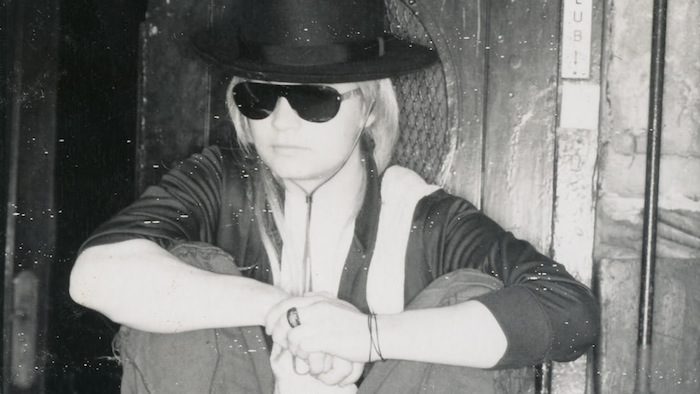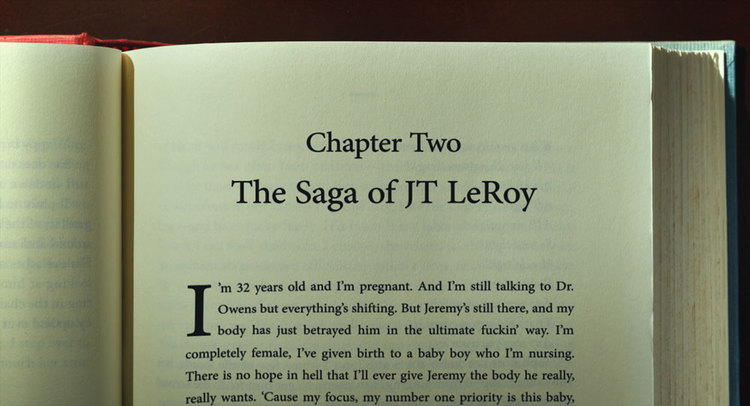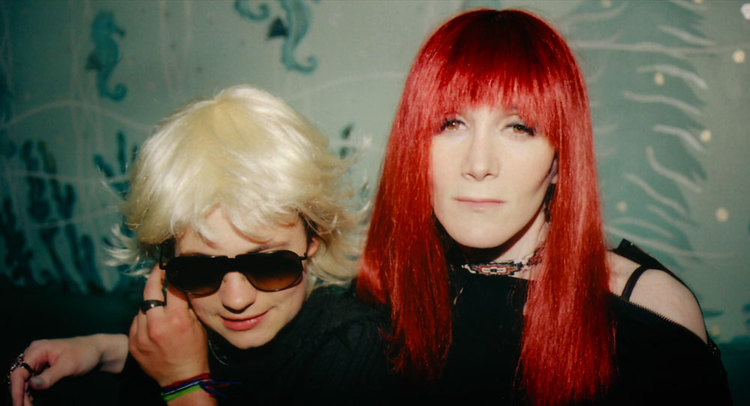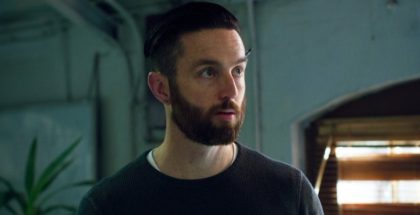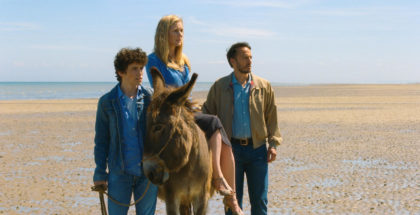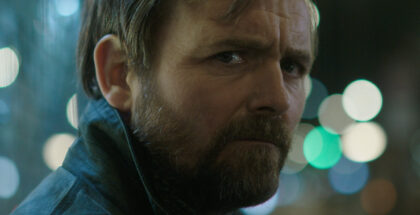Interview: Jeff Feuerzeig talks Author: The JT LeRoy Story, Amazon and amazing true stories
David Farnor | On 30, Jul 2016
“This is obviously one of the craziest stories I’ve ever heard…”
In the 1990s, an author named JT LeRoy became an overnight sensation. He was young, talented, a prostitute turned artist turned celebrity. He also didn’t exist: he was the creation of Laura Albert, a mother from Brooklyn.
What started out as her pen name soon took on a life of his own, as JT was praised by stars such as Winona Ryder and Bono, while Laura found herself getting her sister to play LeRoy in public, as a little white lie spiralled into the biggest literary hoax in history.
20 years on, Jeff Feuerzeig has persuaded Laura to tell the whole tale in the fascinating documentary Author: The JT LeRoy Story. Premiering at Sundance this year, the film was promptly acquired by Amazon to release in the US as an Amazon Prime Video original. As UK distributor Dogwoof brings it to our cinema screens, we meet the director to talk strange stories, streaming, and Amazon’s commitment to indie film.
We catch up with him just ahead of the film’s UK premiere at the Sundance London festival. Flying in from the US the night before, he rushes into the restaurant in a London hotel, still recovering from jet lag. His appetite, though, is wide awake, as he downs coffee and eyes up the breakfast bar.
The only thing he’s more excited about than breakfast is his film, which follows The Devil and Daniel Johnston to form something of a double-bill studying creativity, celebrity and madness.
“I had no idea,” he begins, then stops himself. “That’s actually not true – I used to read a fantastic newspaper in New York called The New York Press, which was the rival of The Village Voice, and JT used to publish pieces in that, so I had read some of those and I was aware of the name, only from that, but I had not read the books.”
Even then, though, he was unaware of the story behind the pen-name: when the New York Times unmasked Laura, it was off his radar. It was only when a journalist friend of his turned him on to the story that he read up on the scandal.
“I read all those pieces, Rolling Stone, Vanity Fair… they were all fascinating, but there was one voice glaringly missing. I was like ‘Hmm, that’s the voice I want to hear’. And I wanted to hear who was this person who wrote the books, who was this person who did a boy’s voice on a telephone for over a decade, who was this person who went out in public as this British woman, Speedy. That’s the storyteller. How do I get to her?’ So I reached out to her.”
“Years ago, doc filmmaking was old and stuffy, right? But it’s not anymore.”
It’s the kind of move that emerges as what can only be described as “classic Jeff”: he’s a director who gobbles up subjective stories like he’s currently spooning up his yoghurt.
“My whole trip in what I do in documentaries, my biggest influence is the New Journalism of the 60s and 70s and I love subjective storytelling. Films like The Kid Stays in the Picture, Brett Morgen, it’s a singular voice, I think it’s a fantastic film. The film Tyson [from 2008] about Mike Tyson the boxer, it’s brilliant. Singular voice.”
He drops names and references without pausing for breath, as he warms to the subject of non-fiction filmmaking’s appeal.
“Non-fiction storytelling, I’ve always thought, I’ve been saying this for two decades, for me personally, it’s the last vestige of true, independent filmmaking. It’s a choice I made because a. it was like a canvas you could paint on for less money but you could, from a storytelling point of view, you can do things that you can’t even do in narrative film. What I’m able to do, I’m able to take ideas of POV, recreation, animation, still framing things in a three-act narrative, I’m doing re-contextualisation of found footage, I’m doing ideas that I dreamed of doing because I love cinema.”
The clatter of his spoon is the only thing that interrupts his enthusiastic flow.
“When I watch great documentary, I don’t care who it’s from, I just think of it as if it’s good, it’s a great film I’ve seen. I don’t think of documentaries as a lesser medium. It’s very freeing.”
The appeal seems to be spreading among audiences too. Between true crime series and Oscar winners such as Amy, non-fiction has arguably never been more popular.
“Years ago, doc filmmaking was old and stuffy, right? But it’s not anymore,” Jeff nods, picking up a bit of fruit with his spoon.
“I just think non-fiction filmmaking is a very powerful form of communication. You can see ideas in it. If you’ve got the ideas, you can execute them.”
“I’m trying to make the most immersive experience I can.”
With such a vocal passion for the form, it’s no surprise that his work has the same fizz. Jeff was the first person (of many) who had approached Laura about JT LeRoy that she said yes to. Why? The Devil and the Daniel Johnson.
“It was because of my film,” he reveals. “The work spoke for itself. And to quote her, she said ‘I’m gonna work with you, because you’re a Jew and you’re punk rock’ and that’s both true.”
Feuerzeig, of course, wasn’t interested in scrutinising what happened or getting the bigger picture out there – that had already been done in detail across the web – but in finding a new truth to the situation.
“Most [documentaries] often now have multiple talking heads,” he continues. “I’m trying to make the most immersive experience I can give you and through subjectivity, I think my attempt was to make a very unique film. You’re getting the voice of JT.”
How hard is to get that voice? With the creator of JT such a vivid storyteller, is it a case of coaching and directing Laura, or just putting a camera in front of her and letting her loose?
“Direction might not be the right word,” reflects Jeff. “I’m obviously the director and writer of the film. She is the teller of her tale. I’m helping her to tell her story. She can tell me anything she wants. I don’t do a conventional interview. I know Errol Morris uses the word “Interrotron”. I’ve never interrogated anybody. I help them tell their story. I help people stay in the moment, so it unfolds and I assemble it in a satisfying three-act narrative that moves forward; it has that energy. Staying in the moment, as opposed to telling it like a war story that happened in the past, is a huge difference so I do help that happen. She is supplying the story, I’m just helping her get through it. It was like eight days together.”
The film combines voicemail messages from famous fans of JT, as well as footage from the making of 2004’s The Heart Is Deceitful Above All Things, directed by and starring Asia Argento, which was based on LeRoy’s novel. Was it hard to get that material?
“That was simple, the producer of that film is a great producer, he produced Spring Breakers, Buffalo 66 – a guy called Chris Hanley. Hanley was very supportive of [Author: The JT LeRoy Story] from day one and gave me his whole archive. He actually shot a lot of the archival material behind-the-scenes, so we licensed it from him.”
“[Amazon’s] Ted Hope is the face of what independent film producing deserves to be…”
All this, from finding funding and making the thing, took five years. Almost as soon as it was finished, the end product was promptly pounced upon by Amazon as an original for its Prime Video service in America. How did he react to that offer?
“I was thrilled!” comments Jeff. “The film we made, just like Devil and Daniel Johnston, it’s a million-dollar doc, I’m doing my best to paint on a large canvas. Doc’s a strange word now. Everyone loves docs, but they’re all very different. I love issues docs, but I don’t make them, and they’re very, very different. So the aesthetics of what I’m doing, I’m hoping there’s a large canvas for a large commercial audience, not just doc people – that remains to be seen.”
Amazon’s film arm is being headed up by Ted Hope – his official job title: Head of Motion Picture Production – who has been around in the industry for years. He even exec produced The Devil and Daniel Johnston, making Author: The JT LeRoy story something of a reunion for Feuerzeig.
“Ted Hope is the face of what independent film producing really deserves to be,” says Jeff. “I don’t know how many films he’s produced, but many great ones. And independent film spirit is built into his DNA. I love his taste and I admire the films he’s made.”
Together with Netflix, which has invested significant money and resources in acquiring and producing documentaries to stream worldwide, Amazon has become a hero for smaller filmmakers. Feuerzeig has nothing but good things to say about them – and believes Hope at the helm of Amazon Studios is a smart fit.
“The fact that you can reach larger audiences… It’s great, you know, from what I’ve read, they’re shaking it up because it’s a necessity, because the studios don’t do these kind of films anymore. So someone’s gotta make ’em – and you might as well have someone who’s passionate about them wanting them out there, because obviously audiences are thirsty for these kind of stories.”
The yoghurt and coffee have now been fully drained.
“What I find with people I run into is for whatever reason, they’re always, the conversation films are non-fiction,” he continues. “It’s like ‘Oh my god, have you seen this doc?’ I’m finding that all over the States. And that’s lovely to me.”
It’s easy to imagine people having a similar reaction to JT LeRoy, given how bizarre its subject matter is.
“This is obviously one of the craziest stories I’ve ever heard, ok?” laughs Jeff. “I don’t know how you get crazier or find crazier?”
How about Errol Morris’ Tabloid, I offer.
“I love that film!” he grins. “It’s a real piece of art. My friend Mark is a producer of that and he also produced Errol’s film, The Thin Blue Line. I love truth is stranger than fiction stories, because it’s not a cliche. It’s true! I thought Devil and was one of the craziest stories ever and I think Author tops it.” He pauses and splutters. “It’s just… the story’s mad! You know?”
A waiter appears and asks if he wants anything more to eat or drink. He declines, but with a connection to Amazon and an active fascination with the world around him, you can bet it won’t be long until Jeff is back for another helping.
Photos: Dogwoof.


